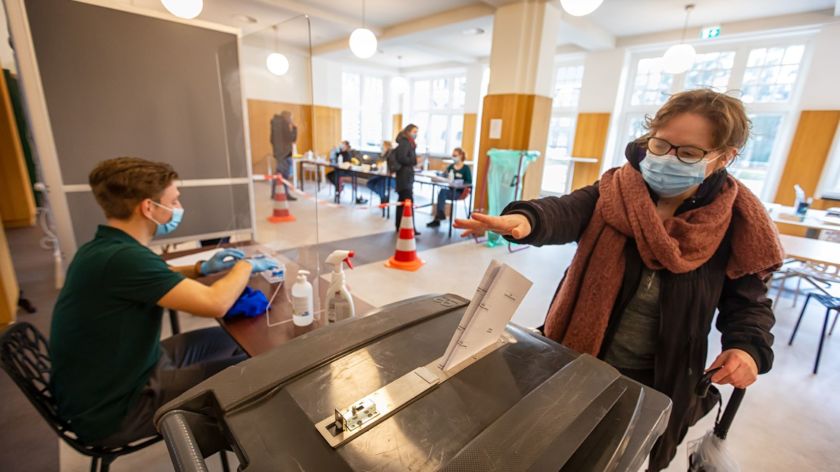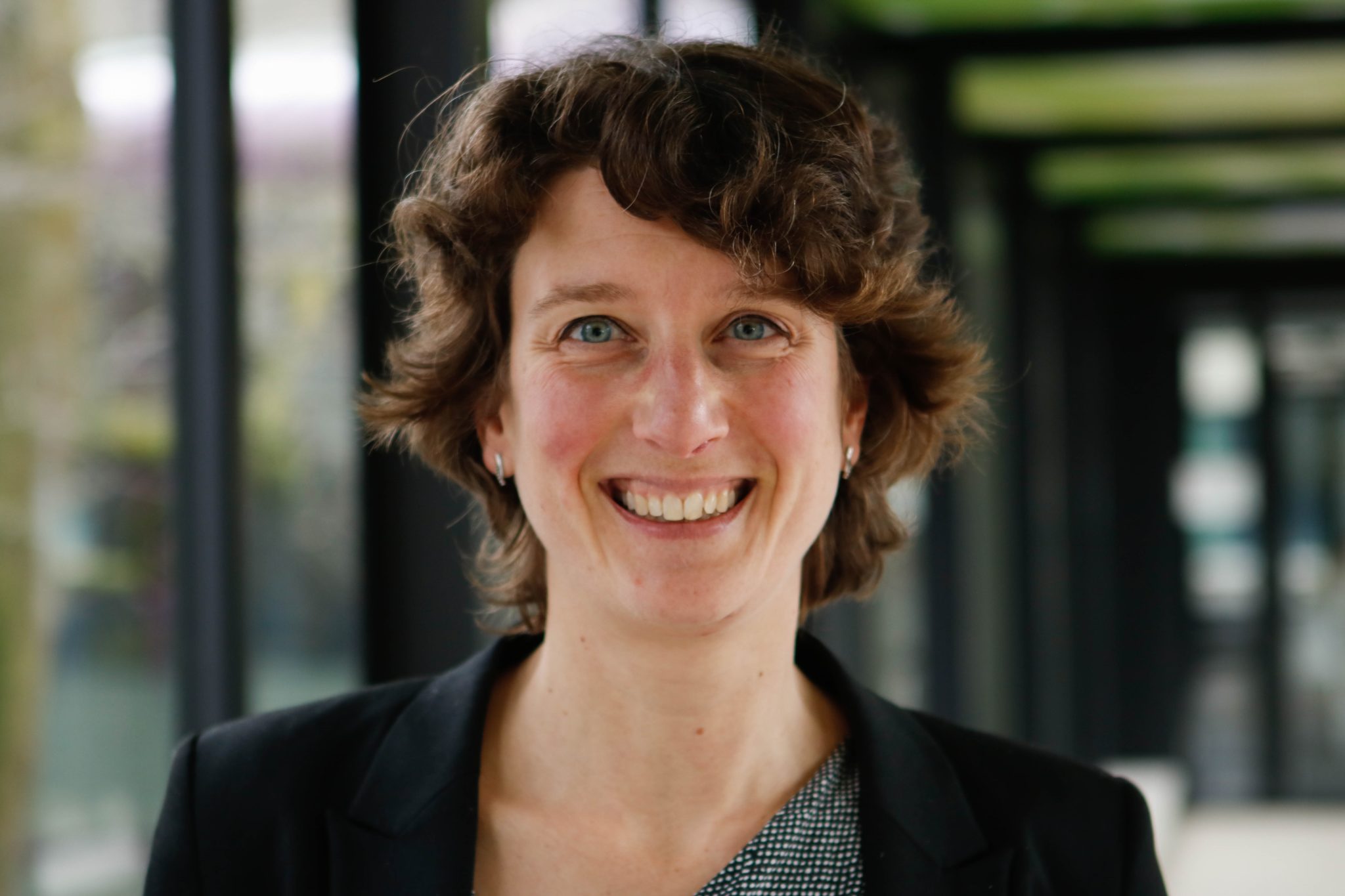‘These election results are not necessarily good news for the academic world’
-
 Polling station at the Berchmanianum cloister. Photo: Dick van Aalst
Polling station at the Berchmanianum cloister. Photo: Dick van Aalst
Victory on the right, some tears shed on the left and a historical degree of fragmentation. What do these election results mean? How did it come to this and what are the consequences? Three Radboud researchers reflect on the 2021 Dutch general election.
Peter van der Heiden, Political Scientist affiliated with the Faculty of Arts
‘What I find most striking is the rise of the right-wing parties. The parties to the right of the People’s Party for Freedom and Democracy (Dutch: VVD) now jointly have more seats than all left-wing parties put together. I suspect that most of the seven to eight seats lost by GreenLeft (GroenLinks) went to Democrats 66 (D66) and Volt; the constituencies of these parties are kind of communicating vases anyway in terms of demographics. Socialist Party (SP) supporters on the other hand are more likely to have turned to the Party for Freedom (PVV) or the Forum for Democracy (FvD). Like these parties, SP doesn’t focus on international solidarity.

Fragmentation within the political landscape (we’re potentially looking at 17 parties in the House of Representatives, Eds.) has reached a historical high. Things are getting crazier and crazier. The only comparable situation was the interwar period, when there were an equal number of parties in parliament, including oddities like the Middle Class Party (Middenstandspartij). Incidentally, we shouldn’t underestimate the role vote compasses play in this fragmentation. They’re consulted by growing numbers of voters and their recommendations often include parties that receive relatively little attention in the media. As a result, voters may be prompted to study these parties’ programmes in more detail.
‘We shouldn’t underestimate the role vote compasses play in this fragmentation’
The fragmentation won’t affect government formation all too much. It’s still possible for four parties to get a majority in parliament. The People’s Party for Freedom and Democracy and Democrats 66 are more or less inescapable; they’re factually condemned to each other. Although I suspect they’ll play harder to get than they did four years ago; their newly won seats will have boosted their self-confidence. However, this can also lead to tension in negotiations with other parties, so they shouldn’t take too arrogant a stance.
These election results are not necessarily good news for the academic world. Traditionally, the left has had more attention to education and culture than the right. Once the government has to pay back all its Covid-19 loans, a party like the People’s Party for Freedom and Democracy is more likely to cut back on the collective sector than impose higher taxes on businesses. In their view, the industry is too important as the driving engine of the economy.’
Anne Bos, researcher at the Centre for Parliamentary History
‘A turn-out of 82.6%! That’s much higher than predicted. It nearly but not quite beats the 1977 record. Remarkably enough, people then too predicted a lower turn-out because of the train highjacking in De Punt, which dominated the news at the time. It seems that in times of crisis, people are actually more likely to vote. And of course, right now, with the Covid-19 pandemic, there really is a lot at stake. Politics has become more visible than ever and political decisions impact people’s daily life.
Strong leadership has been rewarded in this election. In times of uncertainty, people favour politicians who set the course. What would have happened to Democrats 66 if Sigrid Kaag had not stepped forward? The Christian Democratic Appeal party (CDA) lacked such a leader, although I also think they lost votes by challenging the People’s Party for Freedom and Democracy and in this way allowing themselves to be pulled further towards the right. Democrats 66 made good use of the vacuum left in the centre.
‘Strong leadership has been rewarded in this election’
It’s unclear at this point what the cabinet formation will look like. As the largest parties, the People’s Party for Freedom and Democracy and Democrats 66 will certainly have a seat at the table. The Christian Democratic Appeal party may join them once they’ve had some time to lick their wounds. At least they still have a say in the Senate, which is quite important. After all, legislative proposals have to be approved by both Houses. But Kaag always said that she wanted a left party in government. Which one will it be? The Labour Party (PvdA) has six seats in the Senate, so that could be a strategic choice. GroenLinks has eight, but since they lost half their seats yesterday, I think it’s a very unlikely combination.
The fragmentation of the House of Representatives doesn’t necessarily mean politics will be less effective. In 1971 there were also 14 parties in Parliament. If they manage to work well together and voters feel represented, it could work.
Of course, what makes this election historical is the fact that Mark Rutte has won for the fourth time in a row. That’s incredible; he’s even surpassed Thatcher. Another 500 days and he’ll overtake the longest-serving Dutch Prime Minister Ruud Lubbers (4307 days from 1982 to 1994, Eds.).’
Maurits Meijers, Assistant Professor in Political Science
‘The Netherlands has certainly shifted to the right. The radical right-wing parties are jointly stronger than ever. The question is: Where did all these votes come from? I suspect Forum for Democracy not only appealed to many voters who are concerned about issues like Dutch identity but with their critical stance on the coronavirus policy they may also have attracted many new voters who feel the measures are going too far. The whole scandal around antisemitism within the party’s youth organisation apparently made little impression on Forum for Democracy voters.
I think the left-wing parties definitely dropped some stiches there. The coronavirus policy weighed like a lid on this entire campaign: The opposition parties were afraid of attacking the government on their approach to the crisis. And that while the left parties could have been far more proactive. Not by arguing that all measures had to go, but by linking classical left-wing themes to the coronavirus crisis. For example, in the last few years there have been substantial cutbacks in healthcare, which is why the Netherlands now has fewer ICU beds available. And in the education sector, classrooms have grown increasingly larger because of teachers’ low wages, which now makes it more difficult to reopen schools safely.
‘Culturally speaking, relations haven’t changed that much’
Incidentally, this shift to the right is limited to the economic sphere. Culturally, relations haven’t changed that much. The block formed by Democrats 66 and parties like GreenLeft, the Party for the Animals (Partij voor de Dieren) and Volt has remained more or less unchanged. Nor should we minimise the victory of the latter. When Forum for Democracy entered the House of Representatives four years ago with two seats, it was with much fanfare. Now things are rather quiet around Volt, and this while they may enter the House with three seats.
Together with my colleagues Victor Ellenbroek and André Krouwel I put forward the idea of giving voters not one, but multiple votes, which they can divide over a number of parties. If we’d had this kind of system, classical power parties like the Labour Party (PvdA) and the Christian Democratic Appeal party wouldn’t have lost so many votes. People didn’t suddenly lose their sympathy for these parties – they’re quite willing to also vote for them – but they feel compelled to choose the one party that fits them best right now. Our idea could potentially counteract the fragmentation in parliament and thus contribute to political stability and continuity.’





